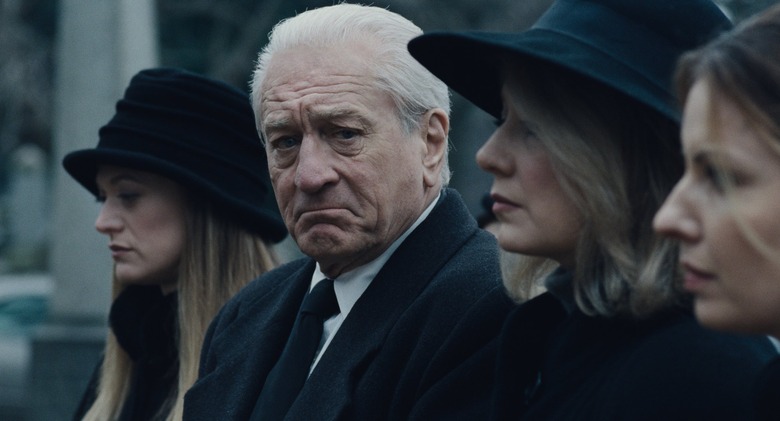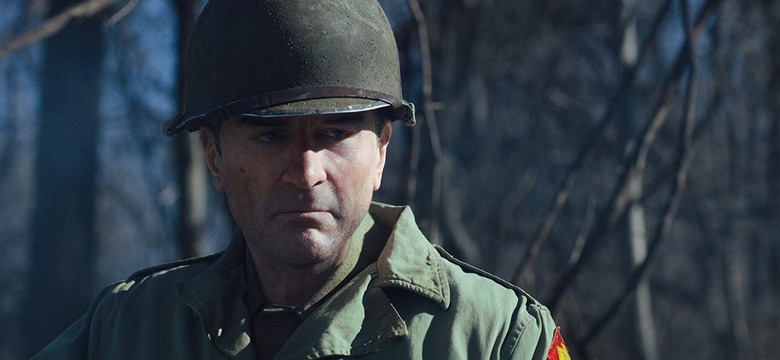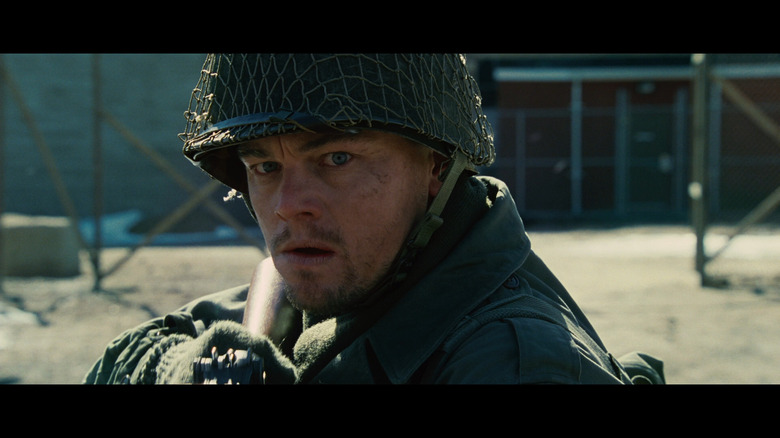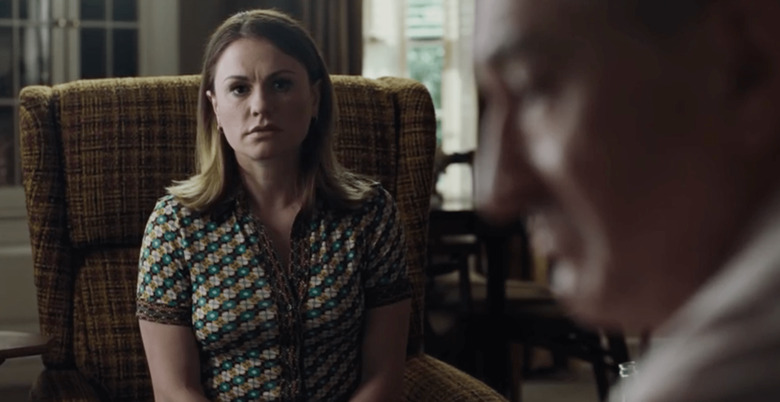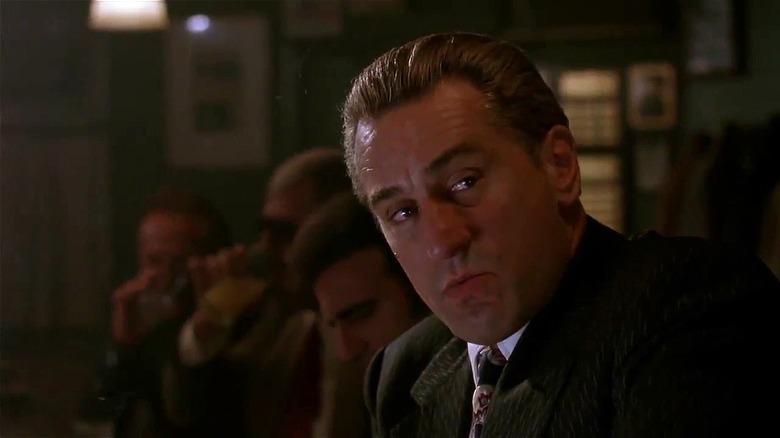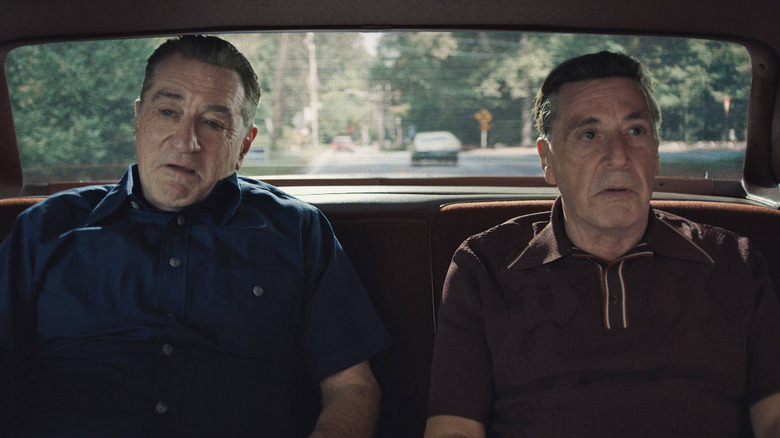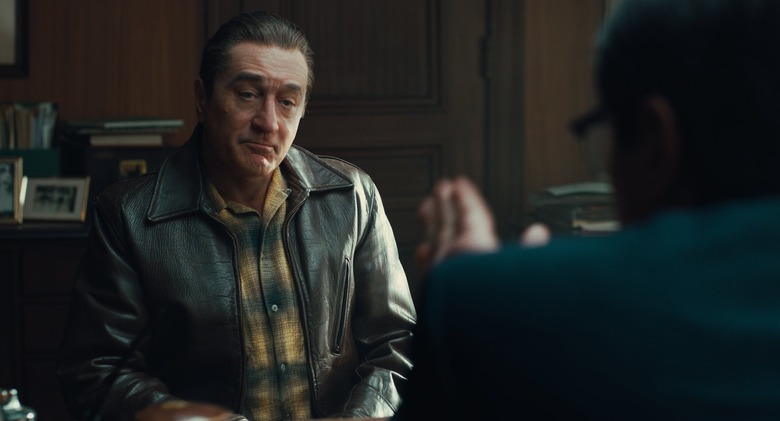The Unpopular Opinion: Okay, Let's Hear From Someone Who Doesn't Like 'The Irishman'
(Welcome to The Unpopular Opinion, a series where a writer goes to the defense of a much-maligned film or sets their sights on a movie seemingly beloved by all. In this edition: The Irishman is a regression on multiple fronts for director Martin Scorsese.)
In ancient Egypt, pharaohs would be entombed with everything they needed for the next life: all their treasures and their mummified cats and even their living servants. This was before someone had the bright idea that you could just make lifelike models of the servants and not have to bury people alive. Obviously, in this case, the models weren't CG ... but you get the point. The Irishman sees Martin Scorsese, our greatest living filmmaker — the Ramses II of cinema — nesting below his pyramid, snug in his bed of mob movie hits. At this point, Scorsese has nothing left to prove. He's made his masterpieces. We can look on his mighty works, and rejoice.
In this one instance, I will not rejoice, because— like Peter Griffin assessing The Godfather — "I did not care for" The Irishman.
Climbing Down from Mount Scorsese
Who will run with me as I make my forward charge and die on this hill? Actually, what we're about to attempt is more like climbing down from a national monument in the manner of North by Northwest. Scorsese is the George Washington on my Mount Rushmore of filmmakers. It goes without saying that his cinematic legacy is secure. The misgivings of one underwhelmed fan certainly can't diminish it.
Nevertheless, as I watched The Irishman — a film that has received universal acclaim — I felt the contrarian rearing up in me, chafing against the idea that it was an instant classic on par with some of his other certified masterpieces. The cynic in me, which goes hand-in-hand with the contrarian, wanted to say that critics are being soft on this movie, because it's Martin Scorsese and Robert De Niro and no one wants to look bad giving their swan song a negative review when the wind is clearly blowing the other way.
De Niro, if you're not acquainted with the particulars of the plot, plays the titular Irishman, Frank Sheeran. He's a mob hitman who gets a phone call from Jimmy Hoffa, inviting him to be "a part of history" based on his house-painting reputation ("paint" being sly mob code for the blood of human targets). He jokes about his prep for killings: "Sometimes with something like this, you might want to go to the bathroom first." We understand all too well that this advice for bladder care applies to the movie, also.
I'm taking for granted that the reader knows who Jimmy Hoffa is. If you don't, perchance, not to worry. We'll address that as this goes along and the diluted power of Hoffa's name will inform how we wrap this up.
In Gangs of New York, Scorsese used Bill "The Butcher" Cutting, played by Daniel Day-Lewis, as a mouthpiece for a line from the Book of Revelation: "I know your works. They are neither cold nor hot. So because they are lukewarm, I will spew you out of my mouth." In a nutshell, that's how I feel about The Irishman. Scorsese is in a moviemaking league of his own, so you can't really judge his filmography except in relation to itself. Going by that standard, The Irishman is nothing we haven't seen from him before. This is Scorsese at his most predictable, overlong, and self-repetitive.
When I say that, it's with full acknowledgment that I'm a little blogging ant whose accomplishments in life pale in comparison to Scorsese's. To paraphrase Casablanca: "The [opinions of a movie blogger] don't amount to a hill of beans in this crazy world." Sure, I could tell you what works in The Irishmen. But the main reason we're here is for the airing of some much-needed constructive criticism with regards to Scorsese's new 3.5-hour film, which hits Netflix on November 27. Time for some tough love.
I Heard You Paint Faces Younger
Apologies in advance to the hard-working people at Industrial Light & Magic and all the rest of the cast and crew of The Irishman. I can well imagine the thrill of receiving a phone call at ILM from Scorsese, his voice pregnant with the deal-making words, "I heard you paint faces younger."
The Irishman's most glaring flaw — the one that anyone who's cringed during the trailers might be able to see coming — is its digital de-aging, which tries to cheat time but just ends up dragging this drama down into the uncanny valley where stately prestige pics don't belong. Maybe if I had played more video games, I would be inclined to forgive this flaw. That sounds sarcastic, but I genuinely wonder if the lack of home video game consoles throughout my life has left me ill-prepared to stomach the intrusive visual effects in The Irishman. The compartments in this box of bitter pills are full, lined up in a row for the viewer to swallow like Sheeran's daily doses of medicine.
Your mileage may vary on whether the de-aging is distracting or not. I found it to be a major stumbling block to my enjoyment of the film (which I wanted to like, believe it or not). Most people will probably watch this movie on the small screen, and who knows, maybe it will be easier to surrender to the willing suspension of disbelief that way. All I can say is, when I watched it on the big screen — with the actors' faces projected large enough to count their individual liver spots — the CGI stuck out like a sore thumb. I felt like it added this strange, puffy plasticity to their faces, and I would catch their faces rippling or shimmering at odd times—as if they were watery shapeshifters who hadn't yet perfected their human masquerade.
The Irishman represents a new kind of tech-enabled Kabuki theater. Instead of dolling up men as women, it trots out performers in viscous young-men makeup. To me, the digital makeup looked more like digital Botox. It called attention to itself and made me acutely aware, much of the time, that the movie was ushering me into a world dominated by decrepit old white men and their game-faced juniors (Academy voters, get your ballots ready! For your consideration: Goodfellas 3: The Golden Years.)
In the end, it left me feeling that some reviewers are too charitable and that this definitely did not need to be a $160 million movie. With Hugo, Scorsese showed himself capable of evolving and embracing technological trends like 3-D. The Irishman made me long for the days when he would just put actors in front of the camera and not muck with their faces on the computer.
The Leo-Shaped Flashback Hole
Maybe I'm just a Luddite and need to get with the times and embrace the possibility of a digitally resurrected James Dean. Or maybe there's a layer of inherent visual artifice that comes with, say, a Star Wars film, which helps muddy the field, letting you know, deep down, that most of what you're looking at is fake, so you can more easily accept its otherwise bizarre CG resurrections (Peter Cushing) and "youthifications" (Carrie Fisher passed away a week and a half after the world saw her young digital likeness pasted on a body double in Rogue One).
Whatever the case, as an Internet nobody and lifelong Scorsese and De Niro fan, albeit one who's literally half their age (they're both 76 and I'm 38), I can only fantasize about what it might have been like if The Irishman had done things the old-fashioned way and brought in Scorsese's frequent collaborator, Leonardo DiCaprio, to play the young Frank Sheeran.
Retroactive fan-casting is the last refuge of the disappointed moviegoer. At the same time, to really make this constructive criticism, it needs to have a suggestion for how to make things better, even if it's a bad one. So let's go with the idea of Leo-led flashbacks, for posterity. De Niro himself convinced us that he was the young Vito Corleone in The Godfather, Part II (this, despite taking the stage after Marlon Brando, which was no easy feat, back then).
Across five movies with Scorsese, DiCaprio has already carved out a niche as a new 21st-century De Niro of sorts, and he's an accomplished enough actor that he or another actor of his caliber might have added a more seamless human touch to this movie. With Scorsese bringing back so many of his previous collaborators for The Irishman (De Niro, Joe Pesci, Harvey Keitel, various Vinyl and Boardwalk Empire faces), it almost feels like the gang's all here, anyway, except for DiCaprio.
Scorsese already directed De Niro and DiCaprio in a 2015 short film entitled The Audition. The 16-minute, $70-million film was bankrolled by a Chinese casino. Wikipedia tells me that it's never had a commercial release. Since most people outside Asia haven't seen it and the novelty factor's still there, imagine how brain-melting it would have been to see DiCaprio join the cast of The Irishman, in addition to all these other legendary performers. A real, flesh-and-blood actor like him, instead of a video game approximation of De Niro in a World War II helmet, would have been such a simple, graceful solution. It would have rescued this movie from expensive CG fakery and filled in a big missing face hole in the reunion pic from Scorsese's filmography.
As it is, what Scorsese gives us with The Irishman is an unglamorous return to mob movie territory, where the men's half-CG faces are now fraying at the edges, skin-walking in unnatural ways. It's as if the production itself forms a metatextual recrimination of itself, bolstering Scorsese's lesson on human frailty and mortality with the lesson that you really can't turn back the clock, even with the most advanced filmmaking techniques.
I can see where an apologist for The Irishman might use this to prop up the argument that the film's flaws are a feature, not a bug. They feed directly into its theme, you see. To that, I would counter that "the play's the thing" wherein Scorsese's own conscience, or the universe itself, perhaps, has caught him as a filmmaker. Actors aren't Benjamin Button: they can't age in reverse, and maybe it's vanity to think you can convince us otherwise in the context of a drama with an ostensibly human focus.
Silent Daughters and Absent Truths
Let's not drift too far away from The Irishman and its cast as they exist in cold reality. There are some very good performances in this film. No one will likely question its craftsmanship on that front. Pesci stands unimpeachable as Sheeran's mob boss and occasional guardian angel, Russell Buffalino. The always-boisterous Al Pacino also injects some life into the film when he finally shows up on the other end of that fateful phone call as Hoffa.
Yet I can't help but think of Anna Paquin. Like Quentin Tarantino, Scorsese has deflected questions this year about the role of women in his movies. In The Irishman, wives are easily discarded, per the Scorsese film norm, and daughters are rendered suspiciously dialogue-free. I don't necessarily believe that every movie needs to pass the Bechdel test or be corrected for gender bias via machine learning, but Paquin is an Oscar-winning actress who starred in her own HBO series for six years. In this creaky film narrative, her main function is just to stare back at her father judgmentally. She's underserved and barely has any lines. If you thought Margot Robbie was non-verbal in Once Upon a Time in Hollywood, just wait till you see Anna Paquin in The Irishman.
To be fair, Sheeran does share a brief, emotional scene with one of his other daughters. That scene is memorable enough that you could make a case it cracks the movie's hermetic patriarchal seal, without fully breaking its airtight hold. Is it disingenuous or all too relevant to mention that Scorsese, in one of his more out-of-touch artiste moments this millennium, once signed a petition demanding the "immediate release" of a convicted statutory rapist? Because everybody likes Chinatown and Rosemary's Baby! When you think of how vital actresses like Lorraine Bracco and Sharon Stone were to Scorsese's past mob movies, it's a mystery why he and screenwriter Steven Zaillian couldn't find time in three and a half hours to throw a little more dialogue Paquin's way.
Credibility is another issue that plagues The Irishman throughout its protracted running time. That it's based on a discredited confession doesn't automatically disqualify the film from telling a good story. I Heard You Paint Houses is the title of the book; the movie flashes that title on screen twice, in big letters, as if it wants to insist that this is its real title, too. In addition, Hoffa articulates the wannabe title in dialogue. His disappearance is one of the great unsolved mysteries in American history and there's always room for artistic license with a mystery like that. Oliver Stone's JFK is still a stunning piece of cinema, even if it functions as more of a shaky counter-myth to real 20th-century history. (David Ferrie, who Pesci played in JFK, makes a cameo here.)
Be that as it may, the dubious nature of Sheeran's real-life confession saps some emotional truth from The Irishman. The movie plays it straight, as if what we're witnessing is fact. Its unrepentant heart beats with a bromantic love triangle, yet there's always the nagging feeling that this is just Sheeran's self-serving insertion of himself into the narrative of Hoffa's disappearance. Maybe that's just the effect Scorsese was going for (another feature, not a bug?), but if so, there's nothing on the surface of the movie to indicate that.
What is on the surface is a story that Slate has likened to "the Forrest Gump of organized crime." Gump famously inserted its title character into archival footage, courtesy of visual effects, so that he could shake hands with dead presidents. The Irishman prefers to imply that the mob rigged Kennedy's election, then assassinated him, and that Sheeran, in his amazing adventures, crossed paths with future Watergate burglars. It's certainly possible those events happened in real life ... truth is stranger than fiction, and all that.
At the same time, it's equally possible that The Irishman pulls the old switcheroo and gives us, "Based on a false confession," instead of, "Based on a true story." In which case, it's hard to feel anything beyond the old familiar bubble-burst feeling that sets in after the smartphones light up to fact-check these kinds of movies. You know the feeling I'm talking about: it's the one that comes when you take a movie at face value and then start reading up on the real history behind it, only to realize that the movie distorted the truth in ways that seem vaguely unscrupulous. A recent example of this would be Bohemian Rhapsody. Never thought I'd live to make a comparison between that film and one of Scorsese's, but there you go.
No Film But What We Remake
Since Disney owns everything now, let me hit you with a metaphor ripped straight from the animated world of DuckTales. The Irishman is Scrooge McDuck swimming in his vault of gold coins, the accumulated treasures of a filmography spent hammering home the same artistic point. At the heart of their work, most great artists have one driving impulse, an idea they keep returning to again and again. Scorsese is no different. Men are sinful yet redemption eludes them, he tells us.
So what else is new? The Irishman sees the aging auteur belaboring this point, repeating himself in a more overt fashion than he's ever perhaps done before. Parts of it feel like a Goodfellas remake, just as parts of Casino and The Wolf of Wall Street did.
When a grocer shoves Sheeran's daughter and he goes to confront the guy, we have a pretty good idea how the next scene is going to play out, because we've already seen an earlier iteration of this scene with Henry and Karen and Karen's across-the-street neighbor in Goodfellas. The Irishman winks at us when it shows sides of beef hanging in the back of a freezer truck, as if to say, "See what I'm doing here? This, too, is a callback to Goodfellas." Likewise, a tense scene in the driver's seat of a car, where a paranoid woman stops short of turning the key in the ignition, plays upon our knowledge of and nostalgia for Casino, a vastly superior film.
In this way, The Irishman cinematically recalls TV mobster Tony Soprano's perceptive notion that "remember when" is "the lowest form of conversation." It's surreal as all hell to see Scorsese reduced to that level of discourse with his audience. It's unbecoming and meta, is what it is. You might argue that, in this instance, "remember when" is all too appropriate given the plot of The Irishman ... but with so many other samey movies floating around out there in the cinematic landscape of the 2010s, did we really need one more, here at the end (and from Scorsese, of all people)?
In a weird way, watching The Irishman almost feels like seeing Scorsese show up late to a party in L.A. and start trying to dazzle the folks there with magic tricks that he's pulled from the J.J. Abrams remix bag. I like Abrams but when I go to a Scorsese film, I don't expect to see him following the same derivative playbook.
Hollywood, in general, now obeys the law of the Terminator franchise: no film but what we remake. Scorsese isn't immune to that, it seems. Sheeran's life in the nursing home recapitulates Henry Hill's life in witness protection, which itself recapitulates Jake LaMotta's post-boxing career in a Miami jail and the dressing room of a New York comedy club.
Be it the San Diego house where Ace Rothstein retires, or Jordan Belafort's New Zealand sales seminar after his minimum security prison stint, Scorsese loves to show us men who are on top of the world — who seemingly have everything they could ever want — only to lose it and go into exile. The players and the setting may change, but the basic fall-from-grace arc his characters undergo remains the same. Instead of "Die Hard in a [new location]," Scorsese likes to do "Paradise Lost in a [new context]."
Billionaire recluse Howard Hughes stands in front of the mirror, obsessively-compulsively repeating the line, "The way of the future," and he, too, is in exile. Even Rodriguez, the Jesuit priest played by Andrew Garfield in Silence, follows this arc when he becomes an apostate, forced to sit and identify Christian objects at a Dutch trading post in Nagasaki. It's as if Scorsese, the guilted Catholic and Hollywood royal, has been training his whole career for the day he forfeits his earthly paradise and enters some grey purgatory in some unknown afterlife.
Beyond the self-admitted cash grab nature of it, Scorsese's contemporary and fellow mob-movie purveyor, Francis Ford Coppola, once said that he originally conceived of The Godfather, Part III as an epilogue akin to, "The Death of Michael Corleone." The Irishman makes a similar bid for an addendum to past filmic achievements, and I'll shoot you straight: young Sofia Coppola's Valley Girl accent notwithstanding, The Godfather, Part III might actually come out looking better on this side of the table. Stick these words in the poster blurb: juxtaposed with the computer-generated floundering of The Irishman, The Godfather, Part III would easily have my vote for "best inferior mob threequel."
Sympathy for the Doddering
In its third act, The Irishman almost redeems itself. The film is at its most effective when it uses the indignities and infirmities of old age to highlight the purgatory that awaits all of us, anyone who lives long enough to see their minds and bodies fail them. At times, the older version of Sheeran trails off into incoherence, as if he can barely string a sentence together while recounting his glory days in the mob. His middle-aged exploits don't come across as impressive, partly because he never truly does feel like he has enough physical vitality to be middle-aged. We can see the old man who lurks uncomfortably under his face at all times, and his character isn't the brightest bulb in the box, anyway. He's just a soldier in the mob who goes along to get along. What that amounts to in the end is a pathetic figure.
The aforementioned Quentin Tarantino once used the word "geriatric" to describe Scorsese's latter-day films. In his typical Tarantino bluster, he's used that word elsewhere, talking about how he didn't want to make "geriatric old colostomy bag movies" but rather "hard-dick movies." In The Irishman, Scorsese goes full geriatric, deliberately undermining his familiar mob tale with visions of elderly life to highlight the weakness and inborn corruption of the human condition (yet again. It's his favorite subject.)
I feel like this whole rant has some ageist overtones to it, but I do believe in respecting one's elders, even when those elders are known for their irreverent treatment of religious icons (The Last Temptation of Christ) and their unrestrained punk-rock provocations via debaucherous black comedies (The Wolf of Wall Street). The Irishman winds down into slow-motion and asks the viewer to adjust to the rhythms of a senior's pace of life. Fair enough, but the film feels self-reflexive when it shows us doomed men digging their own graves. It invites brutal honesty when it has a priest lead us in prayer with the words, "Help us see ourselves as you see us." Bread dipped in grape juice invokes the Last Supper, and along the way, the movie displays text with the ignominious fate of certain characters. The artist wants us to pick up on his signals. Hopefully, that's a two-way street.
With his repeated needle-dropping of "Gimme Shelter" (in Goodfellas, Casino, and The Departed), Scorsese is no stranger to soundtrack tunes by the Rolling Stones. He has a tendency to skew stories toward the perspective of robbers overs cops—most noticeably in The Wolf of Wall Street, which relegated Kyle Chandler's F.B.I. agent to a 30-second subway scene of his own, while the titular big bad wolf flourished all around him for the other 179 minutes of the movie. You can tell Scorsese has sympathy for the devil, as the Stones song goes, but what happens when devils turn doddering? Is there a movie to be made out of that story? Might that movie be justly described as Casino 2: Sympathy for the Doddering? The answer is yes ... but, again, maybe it would have turned out better if it had kept its old men grounded in the present and let younger actors play their past selves.
In summary, The Irishman is a CG misfire that is too deeply entrenched in Scorsese's greatest hits to offer a fresh permutation of the colors on his house-painting palette. It's wall-to-wall white granddads and it gets caught up in the myopia of that perspective, which we've already seen overrepresented on Oscar ballots since before you can say Green Book. It never gets out of the shadow of historical fantasy and it's too long by half. Watching it, I was reminded of the music video for Johnny Cash's cover of "Hurt." That video did more in three and a half minutes than The Irishman manages to do in three and a half hours.
Hoffa Who?
There's a scene in The Irishman when Sheeran's nurse sees an old photo of him with Jimmy Hoffa and doesn't know who Hoffa is. My final takeaway was that this is the film's single most important scene. The day before I saw the film, I had a similar experience in real life. I was talking to a 23-year-old co-worker of mine who is fresh out of college and hails from Ohio, and when I mentioned the names Scorsese and De Niro, she gave an unimpressed shrug, not knowing who they were.
That really burst my movie-loving bubble and put things in perspective for me as a citizen of Earth (which extends beyond the reach of Hollywood and Film Twitter, as it turns out). It made me realize that for all the accolades heaped on him, Scorsese hasn't ever quite achieved the level of household-name recognition that his more populist filmmaking contemporary, Steven Spielberg, has. As cinephiles, many of us hold him in high regard ... but not everyone on this planet is a cinephile.
The "Hoffa who?" scene highlights the fleeting nature of things we tell ourselves are important, be they our allegiances to Teamsters and mobsters or our allegiances to brand-name filmmakers. On some level, perhaps, it's Scorsese recognizing that his films have forked no lightning in the grand cosmological scheme of things. For now, at least, he can rest on his laurels as the greatest director of his generation, but that generation is fast-approaching its curtain call. He and his fellow movie brats thrived in the 1970s, but now they're in their 70s, age-wise.
Scorsese is the rare auteur who has been able to stay at the top of his game, even while playing the young man's game of moviemaking. The Irishman shows that even a modern master like him is destined to come up against his own limitations somewhere. Age is a natural limitation imposed by our bodies; perspective is another limitation that can be expanded on but that often circles back and peers through the same crusty lens filter without knowing it. Scorsese's last film, Silence, may have adhered to the same loose thematic template (woe, the plight of the fallen man), but at least it switched up the plot and setting so that it didn't just feel like it was hitting the same beats with the same stable of actors. It was refreshing to see him venture outside his usual box into a film with some new leads and Japanese actors. The Irishman sees him retreating back to the box.
I'm not going to re-litigate the whole Scorsese vs. Marvel debate here, but I will say that I read his New York Times op-ed immediately after I got out of my screening of The Irishman, and it made for an interesting afterword, or epilogue, to the movie. The essay strikes the note of a filmmaker who has already lost his big-screen paradise and entered the streaming purgatory of Netflix. It made me think both the movie and the man are grappling with obsolescence, like we saw Tarantino doing this summer in Once Upon a Time in Hollywood.
The old guard is waving goodbye. Give it a few hundred years, and the name Scorsese might mean even less than it or Hoffa do to some people now. That's the fate of all living names, The Irishman reminds us. The grass withers, films fade. Terrence Malick — another religious filmmaker and contemporary of Scorsese's — foresaw this, too, when he opened The Tree of Life with a verse from the Book of Job: "Where were you when I laid the foundations of the earth?" The Irishman answers that question, conclusively, by saying: I was living life in the fast lane with my buddies. We were the bad guys, but "we always called each other goodfellas." Until some of us died and my blood thinned and life slowed down and I wound up old and alone in a nursing home.

